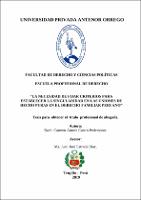| dc.contributor.advisor | Estrada Díaz, Juan José | |
| dc.contributor.author | Castro Pedemonte, Carmen Aurora | |
| dc.creator | Castro Pedemonte, Carmen Aurora | |
| dc.date.accessioned | 2019-05-31T20:23:55Z | |
| dc.date.available | 2019-05-31T20:23:55Z | |
| dc.date.issued | 2019 | |
| dc.identifier.uri | https://hdl.handle.net/20.500.12759/4887 | |
| dc.description.abstract | El presente trabajo de investigación denominado “La necesidad de fijar criterios para establecer la singularidad en las uniones de hecho puras en el derecho familiar peruano”, el cual surge a raíz del Pleno Jurisdiccional de Familia celebrado en setiembre del 2018 en Ica, donde llegaron a cinco acuerdos importantes, dentro de ellos se concluyó que la falta de singularidad ocasional o temporal no puede ser exigida como requisito para declarar de manera judicial la unión de hecho.
La presente investigación está orientada, al estudio y análisis de una de las características de la unión de hecho, que es la singularidad, con la finalidad de generar la protección de esta al momento del reconocimiento de la unión de hecho, y esta protección se genera mediante criterios, los cuales son: la posesión constante de estado de convivencia, la identificación como una familia general y la caracterización de ser una pareja socialmente reconocida.
La presente tesis está compuesta por capítulos, que son los siguientes: el capítulo I, titulado el problema, el cual contiene la realidad problemática, la formulación del problema, los objetivos, tanto general como específicos, la justificación y los antecedentes de la investigación.
El capítulo II, denominado marco teórico, este capítulo a la vez se subdivide en cinco subcapítulos, el primero sub capítulo, se enfoca en el estudio de la familia, el segundo sub capítulo desarrolla el estado de familia, el tercer capítulo analiza las uniones de hecho, el cuarto sub capítulo se enfoca en la posesión constante de estado en las uniones de hecho, el quinto sub capítulo estudia las uniones de hecho en la legislación comparada y el ultimo sub capítulo plantea una propuesta normativa. El capítulo III, desarrolla los aspectos metodológicos, como el tipo de investigación, el diseño de la investigación, el material de estudio, los métodos, recolección de datos y procesamiento de datos que guiaron la elaboración del presente trabajo de investigación.
Y por último, el capítulo IV, este capítulo comprende las conclusiones arribadas de la presente investigación y las recomendaciones.
Para el desarrollo de la presente investigación, se realizó un debido análisis doctrinario y legislativo. | es_PE |
| dc.description.abstract | The present research work called “The need to set criteria to establish the uniqueness of pure de facto unions in Peruvian family law“, which arises as a result of the Family Jurisdictional Plenum held in September 2018 in Ica, where they reached five important agreements, within them it was concluded that the lack of occasional or temporary singularity can not be required as a requirement to declare the de facto union judicially.
The present investigation is oriented to the study of one of the characteristics of the de facto union, which is the singularity, with the purpose of generating the protection of this at the moment of the recognition of the de facto union, and this protection is generated by criteria, which are: the constant possession of coexistence, the identification as a general family and the characterization of being a socially recognized couple.
The present thesis is composed by chapter, which are the following: chapter I, entitled the problem, which contains the problematic reality, the formulation of the problem, the general and specific objectives, the justification and the background of the investigation.
Chapter II, called the theoretical framework, this chapter is subdivided into five sub-chapters, the first sub-chapter focuses on the study of the family, the second sub-chapter develops the family status, the third sub-chapter analyzes the unions in fact, the fourth sub-chapter focuses on the constant possession of status in de facto unions, the fifth sub-chapter studies de facto unions in comparative legislation and the last sub-chapter proposes a normative proposal. Chapter III develops the methodological aspects, such as the type of research, the design of the research, the study material, the methods, data collection and data processing that guided the elaboration of this research work.
And finally, chapter IV, this chapter includes the conclusions of the present investigation and the remunerations.
For the development of the present investigation, doctrinal and legislative analysis was carried out. | en_US |
| dc.description.uri | Tesis | es_PE |
| dc.format | application/pdf | es_PE |
| dc.language.iso | spa | es_PE |
| dc.publisher | Universidad Privada Antenor Orrego - UPAO | es_PE |
| dc.relation.ispartofseries | T_DERE_460 | |
| dc.rights | info:eu-repo/semantics/openAccess | es_PE |
| dc.source | Universidad Privada Antenor Orrego | es_PE |
| dc.source | Repositorio Institucional - UPAO | es_PE |
| dc.subject | Unión de hecho | es_PE |
| dc.subject | Reconocimiento | es_PE |
| dc.subject | Derecho familiar peruano | es_PE |
| dc.subject | Singularidad | es_PE |
| dc.title | La necesidad de fijar criterios para establecer la singularidad en las uniones de hecho puras en el derecho familiar peruano | es_PE |
| dc.type | info:eu-repo/semantics/bachelorThesis | es_PE |
| thesis.degree.level | Título Profesional | es_PE |
| thesis.degree.grantor | Universidad Privada Antenor Orrego. Facultad de Derecho y Ciencias Políticas | es_PE |
| thesis.degree.name | Abogado | es_PE |
| thesis.degree.discipline | Derecho | es_PE |

